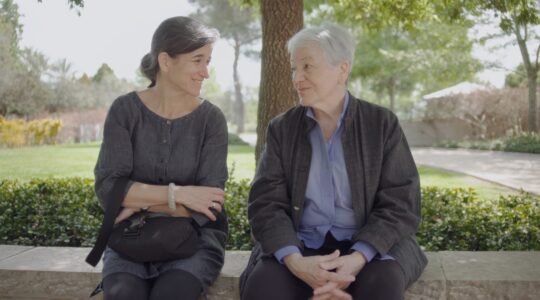Despite efforts by U.S. officials to tamp down expectations, next month’s Mideast peace conference in Annapolis, Md., is looking more and more like a high-stakes roll of the dice by the Bush administration.
And if the gamble comes up empty, experts and activists across the political spectrum fear the results could include new Palestinian violence, a big boost for the terrorist group Hamas and even more disillusionment by a weary Israeli public.
“If it’s just a photo-op, with a lot of pretty pictures and no real progress, you’ll just end up with a new round of violence,” said Judith Kipper, a Mideast specialist with the Council on Foreign Relations.
Calling for a high-profile summit “raises expectations in a region that is desperate,
insecure and traumatized,” she said. “When those expectations are not met, you always end up with new violence.”
“Everybody remembers 2000, when the failure of Camp David was part of what triggered the second Palestinian intifada,” said an official with a major Jewish group here. “There is a widespread view that this was not a good time to call a major conference because conditions aren’t ripe for real progress, but once you’ve set a time and a place, you can’t just let it slide because the risks of failure, or of a perceived failure, are just too high.”
Washington sources say the meeting was scheduled for Annapolis instead of the more convenient and private Camp David presidential retreat because officials feared linking the summit to a peace conference that has become a cipher for inflated expectations and disastrous results.
Signs of trouble about the approaching conference are abundant, including mixed signals about participation by Arab and Muslim countries such as Saudi Arabia, growing pressure on Israeli and Palestinian leaders from internal factions opposed to any concessions on key items and the inability of the two primary partners to agree on the structure and goals of the summit.
Israeli and Palestinian negotiators are working on a joint statement to define some parameters for the meeting, but reports in the Israeli press suggest major gaps persist, especially over the question of when to begin detailed negotiations over critical final-status issues.
“It’s hard to diplomatically ripen a situation that isn’t ripe,” said David Harris, executive director of the American Jewish Committee. “And there are a lot of actors here; it creates a cacophony of definitions and expectations of what’s going to happen. Meanwhile, when you talk to key players, you hear things like they don’t know exactly what to call [the summit], or who is coming. So the basic ABCs haven’t been worked out, while others are going well beyond and raising expectations.”
In recognition of those problems, the administration recently pushed the date of the conference back two weeks, to late November; there is growing speculation it could slip further, perhaps into next year. Still, all signs point to an undiminished commitment to the high-stakes summit — and to mounting risks if the summit sours.
Many analysts say even the perception that the summit was a failure will inevitably weaken Palestinian President Mahmoud Abbas and strengthen Hamas, which now controls Gaza and would like to extend its influence to the West Bank.
Marc Otte, the European Union envoy for Middle East peace negotiations, told reporters this week that without progress at the summit, “Abbas will disappear and then you will have Hamas to deal with,” according to reports in the Israeli press.
It’s not just left-of-center peace process advocates who see huge risks in the upcoming conference.
“We are creating expectations here that absolutely cannot be met; we are inviting people to come and talk about things they’ve talked about before, and under better circumstances could not resolve,” said Shoshana Bryen, special projects director for the Jewish Institute for National Security Affairs (JINSA).
She said U.S. sponsorship of the conference “creates the expectation that we will somehow find the key to fix this, when the truth is, nobody can fix this except for the Palestinians.”
The result of a less-than-successful conference, she said, will be a further diminishment in U.S. clout in the region and a boost to adversaries such as Iran.
The consequences will be even worse, she said, “if Abbas fails” in the wake of a dud conference in Annapolis.
Daniel Pipes, director of the Middle East Forum and a vocal critic of past Israel-Palestinian agreements, said the “best result of the conference is if it didn’t take place. If it does, I can only see mischief as a consequence. If it is perceived as failing, it will harm the Bush administration. It is a risky effort, given the record of past conferences.”
In recent weeks the Bush administration, sensing the problems it would face in getting all the parties to the negotiating table and producing a workable agenda, began working to lower expectations.
But it also sent out conflicting messages suggesting the region could be ripe for a breakthrough.
“I truly sense a real sense of momentum among Israelis and Palestinians to end their conflict,” said Secretary of State Condoleezza Rice last week, speaking to a group of American Muslims. “We will hold an international meeting soon, a substantive and serious one, to address the core issues. And I know that we plan to work hard and I know that you will support us as we try to make that a success.”
Not surprisingly, opinions vary widely about how to avoid a conference that will set back, not advance, the peace process.
Major pro-Israel groups are working hard to keep the focus on the Palestinians and the Arab and Muslim countries whose support for genuine negotiations is seen as vital.
Recently the American Israel Public Affairs Committee (AIPAC) touted a letter signed by 79 senators who said the success of the meeting “will depend on the cooperation we receive from the larger Arab world, particularly from those Arab states with close relations with the United States who have not yet signed agreements with Israel.”
Lack of such support in the past, the lawmakers said, “made it difficult to reach earlier agreements.”
Harris, the AJC director, said one key to a successful conference is “working with the parties and, above all, letting them work with each other. And you have to push back with those Arab countries that are demanding but not delivering. They’re saying what they expect from the conference, but resisting questions about what’s expected from them.”
Cooperation from countries such as Saudi Arabia, he said, is critical to “prevail over attempts by the Iran-Hamas-Islamic Jihad faction to defeat it.”
Recently the Israel Policy Forum, a peace process advocacy group, sent a “policy paper” to top U.S. officials detailing recommendations to “save the conference,” reflecting the group’s view that a president who has not done enough to press for peace on the Israeli-Palestinian front was now not doing enough to ensure the success of its own peace conference.
Among their recommendations: an acknowledgment the upcoming meeting is only the first in a series and the use of a full-time, high-level envoy — possibly former British Prime Minister Tony Blair — to “work on the players full time to produce a Declaration of Principles.”
If such a declaration cannot be produced by the scheduled time of the meeting, it should be “postponed until it is ready,” the panel of diplomats said.
They also recommended the administration “structure a series of incentives and steps, with verification, for the Palestinians, Israelis, Saudis and Syrians in order to promote progress and prevent a breakdown.”
David Makovsky, a senior fellow with the Washington Institute for Near East Policy, said the key to a successful conference is finding ways to give each side something tangible to bring back home without creating expectations of a major breakthrough.
“Both sides need to feel they gained,” he said. “If only one side does, then it won’t work. To me, the question is finding something short of a final-status breakthrough that the parties believe is attainable, so the meeting is more than photo-op.”
Rice, he said, is “looking for some principles that will help shape final-status talks, but not explicit to scare the publics on both sides.”
He said the conference represents a high-stakes balancing act.
“If the moderates aren’t seen as being able to deliver a deal, they will be discredited on both sides, and the radicals will surge,” he said. “But if you raise expectations too high, you could see a repeat of 2000, with violence breaking out after expectations are dashed.”
The New York Jewish Week brings you the stories behind the headlines, keeping you connected to Jewish life in New York. Help sustain the reporting you trust by donating today.




